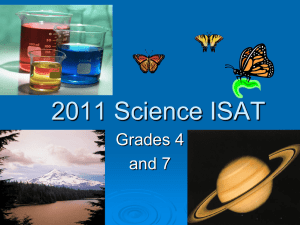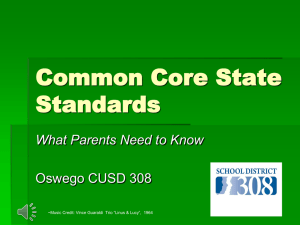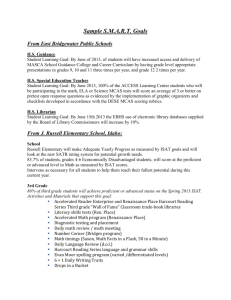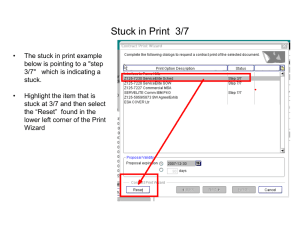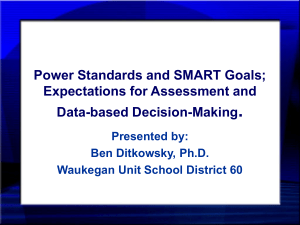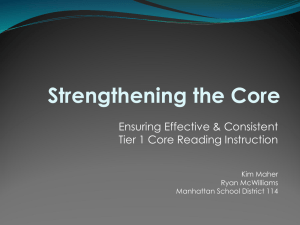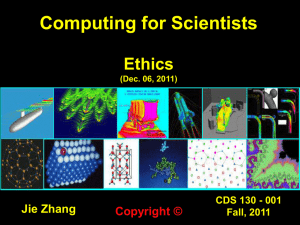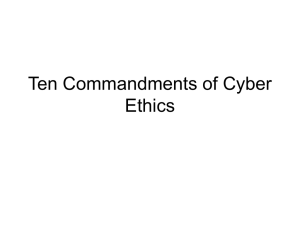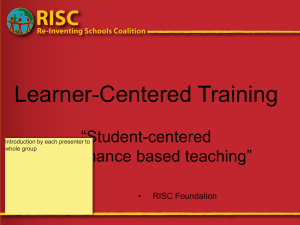ISAT 615
advertisement
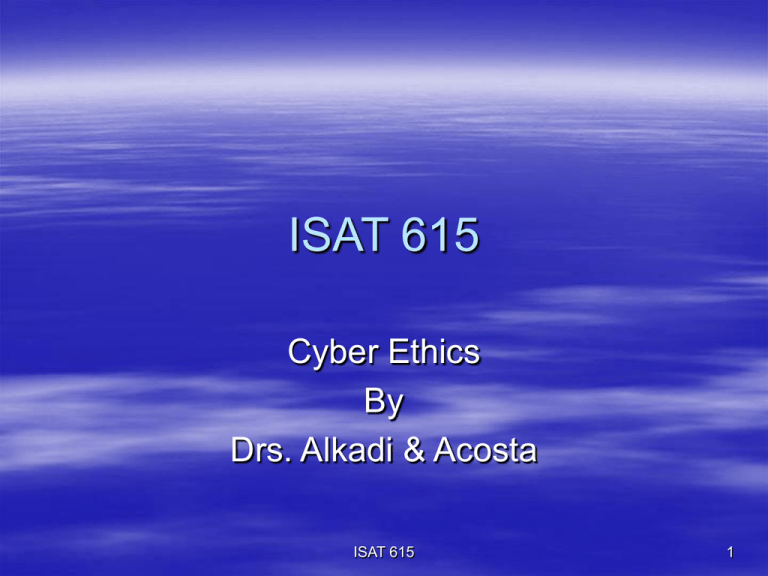
ISAT 615 Cyber Ethics By Drs. Alkadi & Acosta ISAT 615 1 Cyber Ethics The majority of the slides were taken from the book, “Cyber Ethics” by Halbert Ingulli, which is referenced later. For more information, go to: http://halbert.westbuslaw.com ISAT 615 2 Intellectual Property & Cyberspace If seven million people are stealing, they aren’t stealing. David Post, Prof. of law, Temple Univ. Today’s Internet pirates try to hide behind some contrived New Age arguments of cyberspace, but all they are really doing is trying to make a case for Age Old Thievery. When they hack a DVD and then distribute it on the web, it is no different that if someone puts a quarter in a newspaper machine and then takes out all the papers, which of course would be illegal and morally wrong. Michael Eisner, Chairman & CEO, The Walt Disney Company ISAT 615 3 Ethics Case: Napster Is it ethical to listen to as many times as you want a song that you didn’t buy? You will probably send it to a dozen of your closest fiends and relatives. Napster operates on a (P2P) computing model. Users who have downloaded the free S/W from its site can then access the directory of available music and add tunes of their own. Napster’s server is an intermediary, allowing one user to reach the files of another. In other words, you are able to broadcast your request to millions of other music lovers in the Napster’s community. Does anyone else have this CD on their PC, are they online? What happened to Napster? http://archives.cnn.com/2001/LAW/02/20/napster.settlement.03/ ISAT 615 4 Intellectual Property Law Our legal system has developed ways of protecting intellectual property. Congress passed copyrights, patent and trademark laws. What is protected is the expression of an idea, not the idea itself. This follows from the high value we place on freedom of speech and expression. Copyright law protects the tangible expression of an idea from being reproduced without the permission of the copyright holder. A copyrighted work of art must be original, and created independently by the artist. The law curbs this right, making it last only for a set time period. It also permits reproduction of portions of copyrighted work for limited work such as criticism or classroom instruction. Visit http://www.copyright.gov ISAT 615 5 ISAT 615 6 Ten Commandments Of Computer Ethics Created by the Computer Ethics Institute 1.Thou Shalt Not Use A Computer To Harm Other People. 2.Thou Shalt Not Interfere With Other People’s Computer Work. 3.Thou Shalt Not Snoop Around In Other People’s Computer Files. 4.Thou Shalt Not Use A Computer To Steal. 5.Thou Shalt Not Use A Computer To Bear False Witness. 6.Thou Shalt Not Copy Or Use Proprietary Software For Which You have Not Paid. 7.Thou Shalt Not Use Other People’s Computer Resources Without Authorization Or Proper Compensation. ISAT 615 7 Ten Commandments Of Computer Ethics Continued 8.Thou Shalt Not Appropriate Other People’s Intellectual Output. 9.Thou Shalt Think About The Social Consequences Of The Program You Are Writing Or The System You Are Designing. 10.Thou Shalt Always Use A Computer In Ways That Insure Consideration And Respect For Your Fellow Humans. http://www.brook.edu/its/cei/overview/Ten_Commanments_of_Computer_Ethics.htm ISAT 615 8 ISAT 615 9 Workplace Surveillance 90% of all companies with more than 1,000 employees currently use e-mail. Sixty billion messages are sent annually. Employees are under the impression that their messages are private. Old and deleted messages are archived and easily accessible by the management. In the US there is no comprehensive, uniform legal standard protecting privacy. http://www.PrivacyExchange.org ISAT 615 10 ISAT 615 11 Interesting Quotes I find the information age to be a healthy thing…the more you know about somebody else, the better off everybody is. Owner of personal database company There is the possibility of becoming an even more satisfied society based on unequal access to information in which individuals live in glass houses, while the external walls of large corporations are one-way mirrors. Gary T. Marx, Professor of Sociology, MIT ISAT 615 12 Government Regulation Vs. Industry Self-Policing In 1998, several major companies such as, IBM, HP, AOL and MS formed the Online Privacy Alliance (OPA). The Website is: http://www.privacyalliance.com The AOL incident in 1998 stepped up the self-policing on the part of businesses to protect themselves against lawsuits. It has forced AOL to revise its privacy policy in 1999. MS and IBM announced that their companies would pull their advertising from Websites that failed to post privacy policies in sync with their own. ISAT 615 13 ISAT 615 14 What Cyberspace Knows About You If you go to http://www.cdt.org you will learn how much government and employers can discover about you. Go to http://www.aclu.org/privacy and you will find that a lot of information about you could be available to anyone. Spy Technology has become increasingly sophisticated, check out some of the sites that retail surveillance technology: http://www.intercept-spytech.com http://eaglevision1.com ISAT 615 15 ISAT 615 16 ISAT 615 17 ISAT 615 18 ISAT 615 19 Big Brother in Cyberspace The government is doing its part in educating Internet users especially our most valuable asset, our kids. Go to: http://www.cybercrime.gov/links1.htm and select the following link: Safety Tips for Kids on the Internet from the Federal Bureau of Investigation This is a hyperlink to the following: http://www.fbi.gov/publications/pguide/pguidee.htm ISAT 615 20 ISAT 615 21 ISAT 615 22 Medical Privacy In his book, The Limits of Privacy, Amitai Etzioni says “it’s Big Bucks we need to worry about, not Big government.” Etzioni continues that in 1996, 35% of the Fortune 500 companies acknowledged that they draw on personal health information in making employment decisions. These companies employ millions of people. Kathleen A. Frawley, VP of the American Health Info. Mgmt. Assoc. says “There is a whole market of people buying and selling medical information.” A.G. Breitenstein, Health Law Institute Director, said, “People are not going to go to feel comfortable going to the doctor, b/c now you are going to have a permanent record that will follow you around for the rest of your life that says you have syphilis, or depression, or an abortion or whatever else.” ISAT 615 23 The Library Bills of Rights I. Books and other library resources should be provided for the interest, information, and enlightenment of all people of the community the library serves. Materials should not be excluded because of the origin, background, or views of those contributing to their creation. II. Libraries should provide materials and information presenting all points of view on current and historical issues. Materials should not be proscribed or removed because of partisan or doctrinal disapproval. III. Libraries should challenge censorship in the fulfillment of their responsibility to provide information and enlightenment. IV. Libraries should cooperate with all persons and groups concerned with resisting abridgment of free expression and free access to ideas. V. A person’s right to use a library should not be denied or abridged because of origin, age, background, or views. VI. Libraries which make exhibit spaces and meeting rooms available to the public they serve should make such facilities available on an equitable basis, regardless of the beliefs or affiliations of individuals or groups requesting their use. ISAT 615 24 ISAT 615 25 Questions Should children be protected from offensive online speech? Should adults? Who should do the protecting: Government? Schools? Public Libraries? Parents? ISAT 615 26 Internet Anonymity In 1997, in ACLU v. Reno the supreme court noted that the Internet “provides relatively unlimited low-cost capacity for communication of all kinds. This dynamic, multifaceted category of communication includes not only traditional print and news service, but also audio, video, and still images, as well as interactive, real-time dialogue. Through the use of chat rooms, any person with a phone line can become a town crier with a voice that resonates farther than it could from any soapbox. Through the use of Web pages, mail exploders, and newsgroups, the same individual can become pamphleteer.” ISAT 615 27 Internet Anonymity Cont’d. The Supreme Court goes on to say, “Anonymity is a shield from the tyranny of the majority. …It thus exemplifies the purpose behind the Bill of Rights, and of the First Amendment in particular: to protect unpopular individuals from retaliation– and their ideas from suppression– at the hand of an intolerant society.” What do you think about the Supreme Court’s stance? ISAT 615 28 Democracy and the Internet I’m very optimistic about the role of human beings in the Information Age, because this is an era where people – their knowledge, and their ability to put that knowledge to work – will be more important than ever before. … The Information Age is enabling people who were previoulsy forced to pursue a single means of wealth creation –those, for example, who lived in remote areas had no option but to work on the land – to choose from a far wide range of work. Technology such as the PC; the Internet and cheap telecommunications have brought amazing mobility to the factors of production.” Bill Gates, 1999 What about non-democratic countries? ISAT 615 29 Ethics and Professionalism “Engineers shall hold paramount the safety, health and welfare of the public in the performance of their professional duties.” Accreditation Board for Engineering and Technology (ABET) http://www.abet.org/ 1. 2. 3. Websites for general resources on Engineering Ethics: http://www.niee.org “National Institute for Engineering Ethics” http://www.nspe.org “National Society of Professional Engineers” http://www.onlineethics.org/ “The online Ethics Center for Engineering and Science” ISAT 615 30 References Ingulli, Halbert, Cyber Ethics, West Thomas Learning, 2002 Martin, Mike W., Schinzinger, Roland, Ethics in Engineering, Fourth Edition, McGraw Hill, 2005 ISAT 615 31
